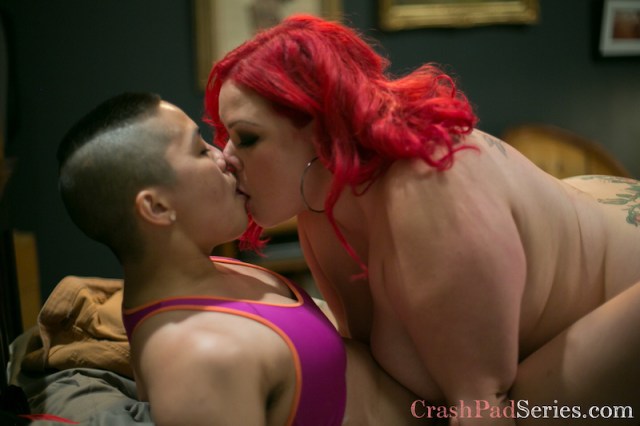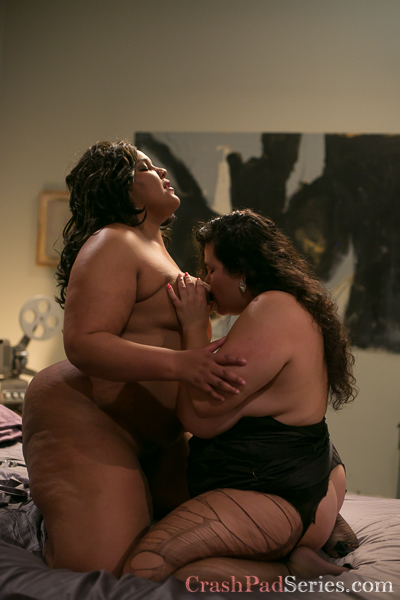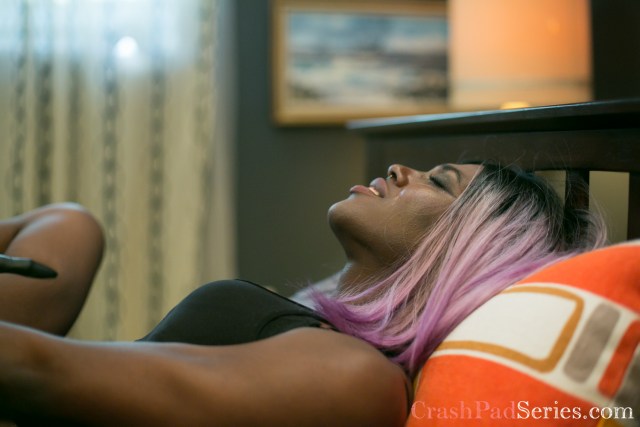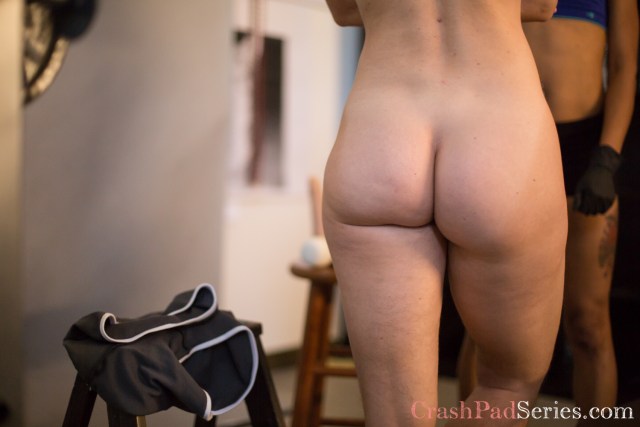Feature of Aviva Romelli and Selphie Labrys in Crash Pad Series episode 216. All of the photographs in this NSFW Sunday are courtesy of the Crash Pad Series. The inclusion of a photograph here should not be interpreted as an assertion of the model’s gender identity or sexual orientation. If you’re a photographer or model and think your work would be a good fit for NSFW Sunday, please email carolyn at autostraddle dot com.
Welcome to NSFW Sunday!

April Flores and Milcah Halili in Crash Pad episode 234
+ A new approach to love addiction is actually two approaches: narrow and broad. In the narrow view, you’re an addict when you show obsessive behavioral signs that interfere with day-to-day life or yours or the love object’s safety, mental health, physical health, or that have social or legal ramifications. But under the broad view, we are all love addicts:
“[T]he broad view … argues that addictions—whether for love, food, or drugs—’are simply appetites: they are felt needs that can be temporarily satisfied, but which become urgent and distracting if one abstains from fulfilling them for too long.’
In other words, everyone is on a spectrum of addiction. ‘This approach would claim that to love someone is literally to be addicted to them, though perhaps only weakly,’ the paper notes. Studies have shown that plain, normal love—as opposed to the disordered behavior described above—stimulates our reward centers in the same way that drugs do.”
+ Maybe that’s also part of why people blurt out “I love you” during sex — along with cultural scripts, finding it hard to give themselves permission to be sexual without a relationship, an overactive endogenous opioid system (because sex) and more. At Broadly, Sirin Kale also notes, “Of course, you might actually feel like you love the moron you’re cresting mid-coitus on a splendid, orgasmic wave. Remember, these feelings are false, but go ahead and suspend disbelief for a bit if it’ll help you get off. Also, stuff you say on drugs doesn’t count.”

Cinnamon and Cicatriz in Crash Pad Series episode 169
+ Dayna Troisi writes about how her disability influences her queer dating life, noting:
“I was pretty self-conscious of my disability at times when I was younger. As if it wasn’t hard enough being a queer teen in conservative Long Island suburbia, I also had my missing left arm to contend with. Even if my classmates weren’t directly saying something about my disability, I was occasionally worrying that they would. My desire to be with a woman was something I realized early in life, but soon afterward I began to fear that my arm made me undesirable.
But luckily, queer women tend to be more accepting. And the older I get, the less concerned I am about my arm counting against my attractiveness. I don’t see my disability as a negative — sometimes I even see it as a positive thing. Now, in my twenties, I feel more confident than ever thanks to age, maturity, and my badass bionic arm. But it’s been a journey getting here — one that has included some not-so-great moments involving my disability and my dating life.”

Aviva Romelli and Selphie Labrys in Crash Pad Series episode 216
+ “Through violent sex, my body bears the pain my mind won’t.”
+ At the Establishment, Lorelei Lee writes about all the ways that pornography will change your life.
+ At Oh Joy Sex Toy, Sarah Winifred Searle writes about bigger bodies, fatphobia and intimacy, noting: “Taking off your clothes in front of other people can be scary, and that feeling is valid regardless of the shape of your body. Also remember that features like rolls, stretch marks, and cellulite are part of what makes a body unique and worth getting to know — and if someone doesn’t appreciate that, they can just go fuck themselves.”
+ These are the most popular sex toys by state.
+ Got a vagina? Here’s how much discharge is normal.
+ Looking for an antidote to that one New York Times piece everyone is talking about on polyamory that featured straight couples and called monogamish couples poly and also really only included primary/secondary partnership dynamics? Check out Poly Pocket instead.

Jiz Lee and Nikki Darling in the Crash Pad Series episode Training Day

I think I’m addicted to breathing. Every time I stop, well, I just wanna do it again! :p
I don’t let myself look at sexy stuff unless I’ve got my work done. I always manage to get my work done on Sundays :) take that as you will AS.
I feel like the broad definition of love addict is totally normal/what everyone is like, even if it’s w friends or family. Even the most introverted person needs some human affection.
If its something that fundamental to being human, it’s not an addiction in normal doses…
The narrow one? Yeah that reads creepy and could be creepy. But it’s how ppl fall in love & how some aspies love. If you’re feeling that one due to the former, try and get a breather from it if you’re at risk of hurting yourself/your crush. If its the latter then try and find a specialist interest that’s not an individual person, if it’s bordering on obsessive (I mean dangerous, same as before). With both, be honest. Which is so hard when you’re in the midst of an intense crush.
I feel like feminists criticise the narrow one a lot which has its reasons, certainly, (its awful to be the focus of it if its unrequited) but it’s important to know that not everyone is doing it to intentionally be a stalker, it could just be how their brain works & if so, advice about how to change is better than pure criticism.
Anyone else out there for whom experiences with disability significantly delayed their development of queer identity? (Like beyond early adulthood)
Um idk if that applies to me or not.
I’m almost thirty so I don’t think I’m still a young adult. I’m aspie with anxiety issues. I know I’m lgbt but I joke w myself that I’m all of those letters.
I read somewhere that autism is caused by extra testosterone. Of course, in an afab person, that’s going to lead to some queerness. Does that & my touch sensitivity to ‘female’ clothes/makeup mean I’m not really trans but just someone who hates what it means to be a woman? Or does the testosterone thing mean im ironically more trans? Idk.
My aspergers (I read this is common in afab aspies) leads to ‘maladaptive daydreaming’. With me that means, creation of characters who feel real, some of whom feel like they’re me. They’re all different genders & sexualities, including the ‘me’ ones. That’s another reason why I could never make a permanent decision over something.
I go along to get along dating wise, really unhealthy & I need to stop but I struggle w boundaries. About three of my ‘relationships’ have consisted of me being too scared to turn a guy down. Same w the sex in them. I’ve only had sex w a woman a few times, certainly less than w a man. I wonder if that affects who I’m really into. I read something that said you’re not really a wlw unless you seek it out, but I don’t have the guts to do that & women don’t approach me.
I can’t go to gay bars cos I’m scared to go to bars alone & I have nobody to go w. so I hate that that’s where a lot of queer identity is formed round here & that the other options aren’t for my age.
My mum implies my identity is being aspergers. Like she doesn’t say that but every time an aspergers thing is on the radio, she tells me to listen to it. She doesn’t w lgbt stuff. When I tried coming out as trans as an adult 1 the first time she said it only counted if I had ‘the op’ and 2 the second time she conflated image & identity and said it was due to the autistic brain being a male one. Ugh I don’t want surgery cos she had surgery when I was nine & we thought she might die. Hospitals terrify me. Also, I’m nb not a transman so I could have it and then regret it… Packers are a far more temporary solution to a temporary issue.
Tldr: I have aspergers and anxiety issues and I think this applies to me.
Hey there, I’m neurotypical and cis so there’s lots of places where our journeys differ.
However, I really relate to the fear you mentioned in relation to hospitals as well as the frustration of feeling cut off from places where queer identity can be developed and grow.
It seems like you’ve been able to think a lot about identity and who you are. I’m glad that’s the case. I’m sorry you’re getting push back from important people in your life.
Thanks so much for sharing your story! It makes me feel less alone. :)
Yes. Thanks for asking this question – it made me feel less alone.
Chronic illness made me housebound for almost all of my 20s (and I was very unwell throughout my late teens). I’m 30 now and still housebound, apart from a short walk on good days and the odd medical appointment. All of this has had an enormous effect on the development of my sexuality and sexual identity. When you’re ill, exhausted and stuck at home, your options are kinda limited.
Last year, aged 29, I realised I’d developed a massive crush on a woman. It came as a surprise to me because I’d never felt that way about a woman before. Turns out my sexuality’s more fluid than I’d previously thought and that’s a nice thing to find out about myself. Although my ability to act on said crush (or romantic feelings towards anyone else) have been impeded by my disability, my ability to *have* feelings isn’t. And that’s something special.
Feeling alone in this is 100% why I asked! Thanks so much for sharing your story! It definitely makes me feel better to know I’m not alone.
I think there are a lot of parallels in our experience! I also had a chronic pain condition that was very active through my adolescence to early 20s. And then I struggled with depression, anxiety and other health conditions through my 20s. (And still do) “When youre ill, exhausted and stuck at home” yup!!!!
When my condition became more manageable, I felt like I had to “catch up” at all the other things like, school, career, etc and didn’t realize that I had totally missed out on a huge part of my development – sexuality and sexual identity.
I simply wasn’t attracted to people, for years and years, because I felt awful and exhausted all the time. By my 30s I had so many weird rationalizations and eventually, so much emotional pain, tied up in the fact that I wasn’t dating anyone that I didn’t even recognize when I did finally start to be attracted to people. Which of course was complicated by the fact that I wasn’t attracted to cis men, so society wasn’t encouraging me to recognize that as sexual attraction anyway.
I’ve been very lucky in having access to a welcoming, active queer community and great counselling. I’m in my early 40s, a lot healthier and for the first time in my life experiencing sexual attraction so often that it’s overwhelming.
I’m a professional, I have great friends, community and a career. I’m looked up to and highly regarded in my professional life and friend circle as someone who has got it together but in this area I feel like such a child and I hate it! I am scared to talk about it in my community because I don’t want people to see me as immature or defective or pathetic (yes, these are my fears I’m projecting bleh) when a big part of my self concept is that I’m capable and talented and self-contained.
I also think growing up with a disability, a big part of my strategy for coping was to just “be okay”, even when I wasn’t. And now I feel like I’m ready to tell people I’m not okay, but where I’m “supposed to be” developmentally at a place waaaaaaaay beyond where I am. And it’s a struggle to be honest with people about how not okay I am. And to initiate conversations about how I need things to go slow, and not knowing what I’m doing on dates. Hate it!
However, it’s great to be able to express this, here, to you, so thank you!!